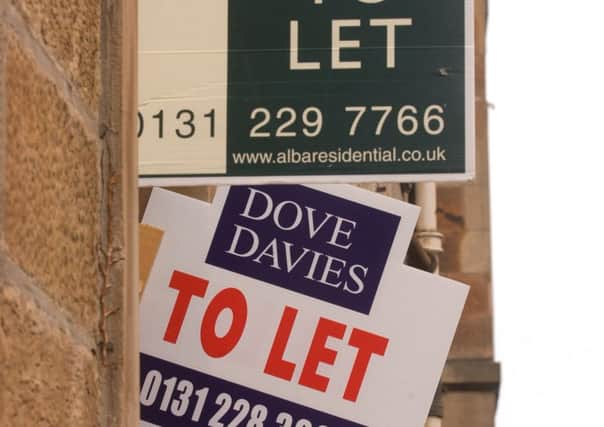New bill aimed at better protecting private tenants


Representing the biggest move forward in private tenancy law in the last quarter of a century the bill has been welcomed by a host of housing charities and organisations.
The Private Tenancies Bill, will introduce a new, open-ended tenancy for private renters, will prevent rents from rising more than once per year and will include provisions for rent controls in high rent hot-spots.
Advertisement
Hide AdAdvertisement
Hide AdIt is expected to be passed before the Scottish Parliament dissolves for the 2016 election.
Figures realeased by Shelter Scotland reveal that the private rented sector in Scotland has doubled over the last ten years and is now home to more than 330,000 households – 85,000 with children.
Graeme Brown, director of Shelter Scotland, said: “This growth and change in types of people living in the sector means the tenancy regime needs a major overhaul.
“Shelter Scotland hopes this Bill will rebalance the relationship between tenant and landlord by improving security of tenure for private renters and laying down a clear, modernised new tenancy, benefiting landlords and tenants alike.
“The abolition of ‘no fault’ eviction is a very big step forward and, combined with a flexible and secure tenancy, it will help families in particular put down roots in their communities and help people to stay in their home for as long as they need.”
Citizens Advice Scotland has likewise welcomed the bill, describing it as ‘good news for tenants and landlords alike’.
CAS spokesman Fraser Sutherland said: “For many years CAS and others have called for action against rogue landlords who use the threat of unfair evictions to get their way, for example by stopping complaints about necessary repairs. The new leases will allow tenants to stay in property that they want to make their home without threat of irresponsible evictions.
“This bill is also good news for responsible landlords too, as they will have better rights against problem tenants who refuse to pay rent.”
Advertisement
Hide AdAdvertisement
Hide AdHowevere landlord agencies have voiced concern over the new bill and its recommendsations, claiming that more affordable hosuing should be built as a way of reducing rent levels rather than rent controls.
John Blackwood, chief executive of the Scottish Association of Landlords said: “We have particular concerns about measures such as rent controls, as well as removing the right of a landlord to end a lease naturally, subject to a reasonable notice period. Whilst we understand the political pressure to tackle rent rises in hotspots such as Aberdeen and Edinburgh, we are concerned these measures could harm investor confidence and drive landlords out of the market, leaving a vacuum that could be filled with less than scrupulous individuals.
“The way to reduce rent levels in a sustainable manner is to increase housing supply, not punishing landlords that are investing tens of thousands of pounds in their properties.”
Earlier this week a report commissioned by Shelter Scotland, the Chartered Institute of Housing (CIH) Scotland and the Scottish Federation of Housing Associations (SFHA), identified a need for at least 12,000 affordable homes to be built each year for the next five years - double what is currently being delivered.
Housing Minister Margaret Burgess said: “The Scottish Government is committed to ensuring every person in Scotland has a safe and warm place to stay, and that there is a sustainable, long-term solution to addressing housing affordability. This includes investing in house building and modernising the private rented sector, so we have a system fit for today’s tenants and landlords.
“The changes outlined in this bill will give tenants greater security and stability in their home and community. It will also give landlords reassurance that their tenants will treat their property as a long-term home, rather than somewhere temporary.
“The private rented sector is changing. It is now home to a growing number of people in Scotland, and we recognise there are some areas where rents are increasing significantly. It is right and responsible to give local authorities the ability to introduce rent controls in order to ease areas under pressure.
“The range of measures brought forward under this bill will ensure the private rented sector is better managed, simplified and successful, and creates a system that works for everyone.”